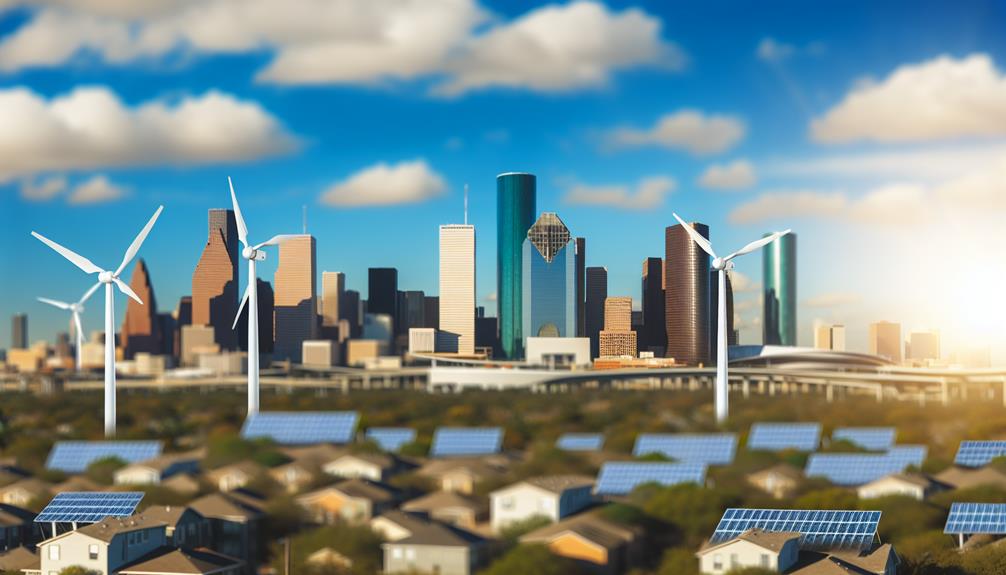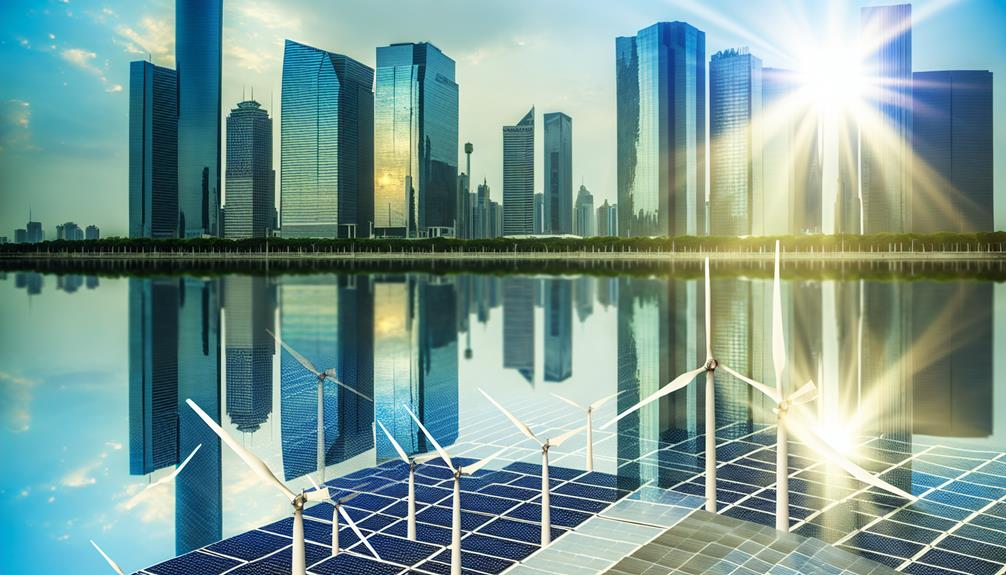Have you ever wondered if Houston's push for green energy is just another plan on paper? Well, let me tell you, it's far from that.
Houston is stepping up its game with real initiatives and investment strategies, showing a true commitment to sustainability that's gaining serious traction.
When you delve into Houston's journey towards renewable energy, carbon neutrality, and cutting-edge practices, you'll uncover a clear roadmap that not only aims for a cleaner environment but also paves the way for economic growth and a more sustainable future.
It's exciting to witness this shift towards a greener and brighter tomorrow right here in Houston.
Key Takeaways
We're on a mission to bring in 50 green energy companies by 2025. Our focus is all about sustainability, aiming to cut residential waste by 50% by 2040. To achieve this, we're rolling out top-notch waste management and recycling programs to make our community cleaner and greener. Our goal is to create a sustainable living environment that all residents can be proud of.
Houston's Green Energy Sector Initiatives
Houston is on a mission to attract 50 green energy companies to the Greater Houston area by 2025, aiming to boost the city's sustainability efforts. To make this happen, there's a strong focus on environmental sustainability from various angles. One key area is cutting down residential waste by 50% by 2040. By rolling out effective waste management strategies and promoting recycling programs, Houston is striving to create a more sustainable living environment for its residents.
Transportation is a crucial piece of Houston's green energy puzzle. Nearly half of the city's greenhouse gas emissions come from getting around. That's why there's a push for eco-friendly transportation options like public transit, biking infrastructure, and incentives for electric vehicles. By slashing emissions from transportation, Houston can take big steps towards a greener future.
Building optimization is another key part of Houston's sustainability playbook. Commercial and residential buildings are major contributors to the city's greenhouse gas emissions. Through initiatives that focus on energy-efficient construction, updating existing buildings, and promoting sustainable design practices, Houston is working to shrink its carbon footprint and create more environmentally friendly structures.
Houston's commitment to environmental sustainability also shines through in its efforts to plant native trees. By aiming to plant 4.6 million new trees by 2030, the city not only enhances its green spaces but also helps with carbon sequestration and protecting biodiversity. Together, these initiatives form a comprehensive growth strategy that positions Houston as a frontrunner in the green energy sector.
Houston's Renewable Energy Investment Plans
When we talk about boosting renewable energy investments in Greater Houston, the key lies in embracing sustainability and innovation. To fast-track the city's plan of enticing 50 green energy companies by 2025, creating enticing incentives is crucial. Think tax breaks, smoother permitting processes, and ensuring easy access to research and development resources. It's also vital to roll out policies aiming to slash residential waste by 50% before 2040. This means getting serious about mandatory recycling programs and establishing composting facilities.
Houston's bold ambition to achieve zero traffic-related deaths by 2030 perfectly aligns with its renewable energy sector growth strategy. To hit this goal, investments in infrastructure upgrades, expanding public transportation choices, and boosting safety for pedestrians and cyclists are a must. And let's not forget the grand plan to plant 4.6 million native trees by 2030 – not only does this help with carbon sequestration, but it also enriches the city's green spaces and biodiversity.
Since transportation plays a significant role in Houston's greenhouse gas emissions, focusing on sustainable transit solutions is a game-changer. Encouraging folks to switch to electric vehicles, creating more bike-friendly infrastructure, and expanding public transit networks can significantly cut down emissions. By weaving these actions into Houston's renewable energy investment roadmap, the city can make significant strides towards its sustainability targets and emerge as a trailblazer in green energy endeavors.
Sustainable Practices in Houston's Energy Sector

Sustainable practices are at the forefront of transforming Houston's energy landscape, driving innovation, and nurturing long-term environmental responsibility. To pave the way for a greener future, Houston is honing in on key areas within sustainable energy practices:
- Cutting Carbon Emissions: By implementing carbon capture technologies, Houston can significantly slash greenhouse gas emissions, making traditional energy sources more eco-friendly.
- Powering Up with Hydrogen: Embracing hydrogen production investments opens doors to clean energy solutions, especially for industries that are challenging to electrify.
- Circular Thinking: Transitioning to a circular economy model in the energy sector fosters recycling, waste reduction, and lower environmental impact.
Houston's dedication to sustainable practices shines through initiatives like energy storage, wind power, solar energy, biofuels, renewable natural gas, electric vehicles, and decarbonization endeavors. By weaving these elements into its energy fabric, Houston not only aligns with global sustainability objectives but also takes the lead in embracing cleaner energy sources.
Prioritizing these sustainable practices not only benefits the environment but also propels economic growth and innovation within the city's energy sphere.
Innovation in Houston's Green Energy Industry
Houston's journey towards a greener future hinges on innovative solutions driving its green energy industry forward. With a goal to attract 50 green energy companies to the Greater Houston area by 2025, the city's focus on innovation is key. The transport sector, responsible for almost half of Houston's greenhouse gas emissions, urgently requires creative approaches within the green energy realm. Additionally, Houston's aim to slash residential waste by 50% by 2040 underscores the crucial role of ongoing innovation.
Commercial and residential buildings, accounting for nearly half of Houston's greenhouse gas emissions, underscore the importance of optimizing structures in the green energy sector. Embracing cutting-edge technologies and sustainable practices in construction and energy efficiency will be instrumental in meeting Houston's environmental targets. Furthermore, Houston's initiative to plant 4.6 million new native trees by 2030 not only promotes sustainability but also aids in carbon sequestration, showcasing how innovation can catalyze positive change in the green energy domain.
To advance towards a more sustainable future, Houston must continue prioritizing innovation across all facets of its green energy endeavors. By fostering a culture of creativity and forward-thinking solutions, the city can lead by example in sustainable practices and environmental stewardship, inspiring others to follow suit.
Houston's Path to Carbon Neutrality

Houston is on a mission to go green and pave the way for a cleaner future. The city is aiming to reach carbon neutrality by 2050, which means cutting down on emissions and embracing sustainable practices. Here's how Houston is tackling this ambitious goal:
- Getting Around: Houston is all about improving how we move around the city. From boosting public transportation to encouraging cycling and switching to electric vehicles, the focus is on reducing emissions and making our urban mobility more eco-friendly.
- Building for a Greener Tomorrow: Energy efficiency is key in Houston's plan. By designing smarter buildings, integrating technology, and revamping existing structures, the city is working towards a more sustainable future. Houston is leading the charge in constructing energy-efficient and eco-friendly buildings.
- Waste Not, Want Not: Houston is getting creative with waste management. By implementing innovative practices and promoting recycling and composting, the city is cutting down on its environmental impact. Rethinking how we use and dispose of materials is crucial in Houston's journey to carbon neutrality.
Houston's commitment to a greener future is evident in these initiatives. By focusing on transportation, building optimization, and materials management, the city is taking concrete steps towards a more sustainable and eco-friendly tomorrow.
Frequently Asked Questions
What Is the Houston Energy Transition Strategy?
The Houston Energy Transformation Strategy is all about boosting the city's economy sustainably through tech advancements, policy changes, and market innovations. The main focus is on cutting carbon emissions and attracting renewable energy companies to Houston, with the goal of generating a wealth of new job opportunities by 2050. It's an exciting vision that aims to make Houston a hub for clean energy and a leader in the green economy of the future.
How Is Houston Changing Policies to Be More Green?
Houston is really stepping up its game to go green! They're making changes in transportation, energy, buildings, and waste management. It's all about embracing sustainable practices like cutting down emissions from buildings, planting more trees, and bringing in green energy companies to help with the transition. It's exciting to see the city making these moves towards a more eco-friendly future!
How Did Houston Become the Energy Capital of the World?
Houston, known as the Energy Capital of the World, has truly mastered the art of blending expertise, cutting-edge infrastructure, and innovative practices. This city's prowess in oil, gas, and renewable energy sectors, combined with its strategic location and highly skilled workforce, has cemented its position as a powerhouse in the global energy landscape. It's not just about resources; it's about the people, the technology, and the strategic vision that drive Houston's energy dominance on the world stage.
What Drives Houston's Economy?
Houston's economy is a dynamic blend of traditional oil and gas sectors complemented by a growing focus on green energy technologies. The city is actively diversifying its industries to attract investments and businesses in renewable energy fields, showcasing a forward-thinking approach to economic development.
